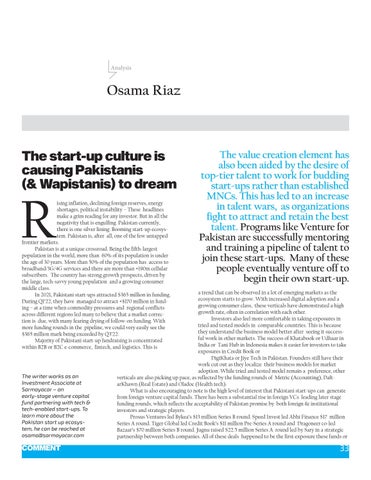Analysis
Osama Riaz
The start-up culture is causing Pakistanis (& Wapistanis) to dream
R
ising inflation, declining foreign reserves, energy shortages, political instability – These headlines make a grim reading for any investor. But in all the negativity that is engulfing Pakistan currently, there is one silver lining: Booming start-up ecosystem. Pakistan is, after all, one of the few untapped frontier markets. Pakistan is at a unique crossroad. Being the fifth-largest population in the world, more than 60% of its population is under the age of 30 years. More than 50% of the population has access to broadband/3G/4G services and there are more than +190m cellular subscribers. The country has strong growth prospects, driven by the large, tech-savvy young population and a growing consumer middle class. In 2021, Pakistani start-ups attracted $365 million in funding. During Q1’22, they have managed to attract +$170 million in funding – at a time when commodity pressures and regional conflicts across different regions led many to believe that a market correction is due, with many fearing drying of follow-on funding. With more funding rounds in the pipeline, we could very easily see the $365 million mark being exceeded by Q3’22. Majority of Pakistani start-up fundraising is concentrated within B2B or B2C e-commerce, fintech, and logistics. This is
The writer works as an Investment Associate at Sarmayacar – an early-stage venture capital fund partnering with tech & tech-enabled start-ups. To learn more about the Pakistan start up ecosystem, he can be reached at osama@sarmayacar.com
COMMENT
The value creation element has also been aided by the desire of top-tier talent to work for budding start-ups rather than established MNCs. This has led to an increase in talent wars, as organizations fight to attract and retain the best talent. Programs like Venture for Pakistan are successfully mentoring and training a pipeline of talent to join these start-ups. Many of these people eventually venture off to begin their own start-up.
a trend that can be observed in a lot of emerging markets as the ecosystem starts to grow. With increased digital adoption and a growing consumer class, these verticals have demonstrated a high growth rate, often in correlation with each other. Investors also feel more comfortable in taking exposures in tried and tested models in comparable countries. This is because they understand the business model better after seeing it successful work in other markets. The success of Khatabook or Udhaar in India or Tani Hub in Indonesia makes it easier for investors to take exposures in Credit Book or DigiKhata or Jiye Tech in Pakistan. Founders still have their work cut out as they localize their business models for market adoption. While tried and tested model remain a preference, other verticals are also picking up pace, as reflected by the funding rounds of Metric (Accounting), DaftarKhawn (Real Estate) and Oladoc (Health tech). What is also encouraging to note is the high level of interest that Pakistani start-ups can generate from foreign venture capital funds. There has been a substantial rise in foreign VCs leading later stage funding rounds, which reflects the acceptability of Pakistan promise by both foreign & institutional investors and strategic players. Prosus Ventures led Bykea’s $13 million Series B round. Speed Invest led Abhi Finance $17 million Series A round. Tiger Global led Credit Book’s $11 million Pre-Series A round and Dragoneer co-led Bazaar’s $70 million Series B round. Jugnu raised $22.5 million Series A round led by Sary in a strategic partnership between both companies. All of these deals happened to be the first exposure these funds or
33
